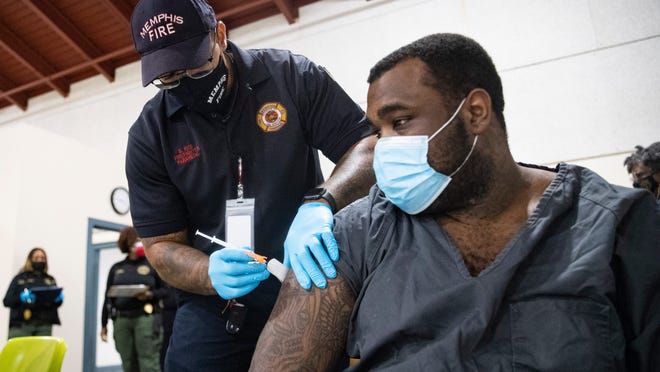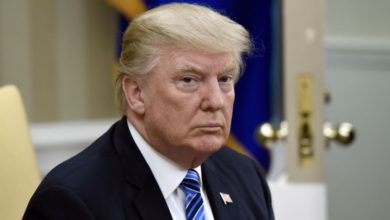
Florida has filed a lawsuit in federal court to block the Biden administration from carrying out a measure to require vaccinations against COVID-19 for federal employees and contractors.
Florida Gov. Ron DeSantis made the announcement at a news conference Thursday morning. where he described the mandate for federal contractors as “heavy-handed” and an overreach by the federal government. He said Florida will seek a preliminary injunction that would block the federal rule from taking effect Dec. 8 as scheduled.
President Joe Biden has argued that the sweeping mandates will help end a pandemic that has claimed the lives of more than 740,000 Americans.
But Republicans nationwide have opposed the vaccination requirements and have threatened to bring similar legal challenges. On Wednesday, 21 Republican state attorneys general sent a letter to the president saying they think his vaccination mandate for federal contractors “stands on shaky legal ground,” is confusing to contractors and could exacerbate supply-chain problems.
DeSantis is eyeing a possible 2024 presidential run and has been consistent in his criticism of Biden's handling of the pandemic and other issues.
— Gary White, The Ledger; The Associated Press
Also in the news:
►Chinese organizers have confirmed participants in next year’s Winter Olympics will be strictly isolated from the general population and could face expulsion for violating COVID-19 restrictions.
►Ohio State University researchers have created a breath test that appears to be highly accurate at rapidly screening patients for COVID-19.
►Florida CFO Jimmy Patronis is trying to lure California-based chain In-N-Out to the Sunshine State amid closures of some locations because employees have gone against local ordinances to check customers' vaccine statuses.
📈Today's numbers: The U.S. has recorded 45 million confirmed COVID-19 cases and more than 743,000 deaths, according to Johns Hopkins University data. Global totals: More than 245 million cases and 4.9 million deaths. More than 191 million Americans – 57% of the population – are fully vaccinated, according to the CDC.
📘 What we're reading: COVID vaccines for kids aren't as clear-cut as for adults. Here are 5 factors for parents to consider.
Keep refreshing this page for the latest news. Want more? Sign up for USA TODAY's Coronavirus Watch newsletter to receive updates directly to your inbox and join our Facebook group.
5% of unvaccinated adults have left a job because of a vaccine requirement
As the federal government prepares to unveil new vaccination rules for workplaces, 5% of unvaccinated adults say they have left a job because of a COVID-19 vaccination requirement, according to a survey released Thursday.
That represents 1% of all adults, according to the nonpartisan Kaiser Family Foundation, which conducted the survey of 1,519 adults Oct. 14-24.
The White House is reviewing an emergency Labor Department rule requested by President Joe Biden spelling out vaccination rules for businesses with 100 or more employees. When released, the rule will fill in the details on how workers at larger businesses must get vaccinated or be tested regularly for the coronavirus.
Separately, federal employees and contractors must get inoculated unless they qualify for an exemption.
— Maureen Groppe, USA TODAY
Economy grew just 2% last quarter as COVID raged, supply snags slowed deliveries
The U.S. economy slowed substantially in the third quarter amid an armada of obstacles, including a surge in COVID-19 cases, supply chain bottlenecks, rising consumer prices and the fading effects of federal stimulus measures.
But with COVID-19 cases now tumbling and vaccinations rising, most economists are branding the weak showing a soft patch in a still-robust recovery from the pandemic-induced recession, with a healthy rebound projected in the final months of the year.
The nation’s gross domestic product, the value of all goods and services produced in the U.S., increased at a seasonally adjusted annual rate of 2% in the July-September period, the Commerce Department said Thursday. Economists surveyed by Bloomberg had forecast a 2.8% rise in GDP.
— Paul Davidson, USA TODAY
Excessive drinking during pandemic leads to dramatic spike in liver transplants, study says
The national list for people seeking liver transplants skyrocketed during the coronavirus pandemic, shooting up 50% higher than predicted before COVID-19 affected the country.
A study released Tuesday by University of Michigan researchers – published in JAMA Network Open – revealed a positive correlation between the increase in the number of people on a waiting list for a liver and the increase in retail sales of alcohol during the pandemic timeframe.
People seeking liver transplants experience alcoholic hepatitis – when the liver stops processing alcohol and instead creates toxic chemicals that trigger inflammation and kill off healthy liver cells needed to survive.
In the new study, researchers compared the exact number of new people put on the U.S. organ transplant list from March 2020 to January 2021 with the projected numbers that were based on pre-pandemic data. Researchers next correlated national monthly retail alcohol sales records between January 2016 and 2021.
— Scott Gleeson, USA TODAY
Cheap antidepressant shows promise treating early COVID-19
A cheap antidepressant reduced the need for hospitalization among high-risk adults with COVID-19 in a study hunting for existing drugs that could be repurposed to treat coronavirus.
Researchers tested the pill used for depression and obsessive-compulsive disorder because it was known to reduce inflammation and looked promising in smaller studies.
They've shared the results with the U.S. National Institutes of Health, which publishes treatment guidelines, and they hope for a World Health Organization recommendation.
“If WHO recommends this, you will see it widely taken up,” said study co-author Dr. Edward Mills of McMaster University in Hamilton, Ontario, adding that many poor nations have the drug readily available. “We hope it will lead to a lot of lives saved.”
The pill, called fluvoxamine, would cost $4 for a course of COVID-19 treatment. By comparison, antibody IV treatments cost about $2,000 and Merck's experimental antiviral pill for COVID-19 is about $700 per course. Some experts predict various treatments eventually will be used in combination to fight the coronavirus.
— Associated Press
Contributing: The Associated Press
Source link









